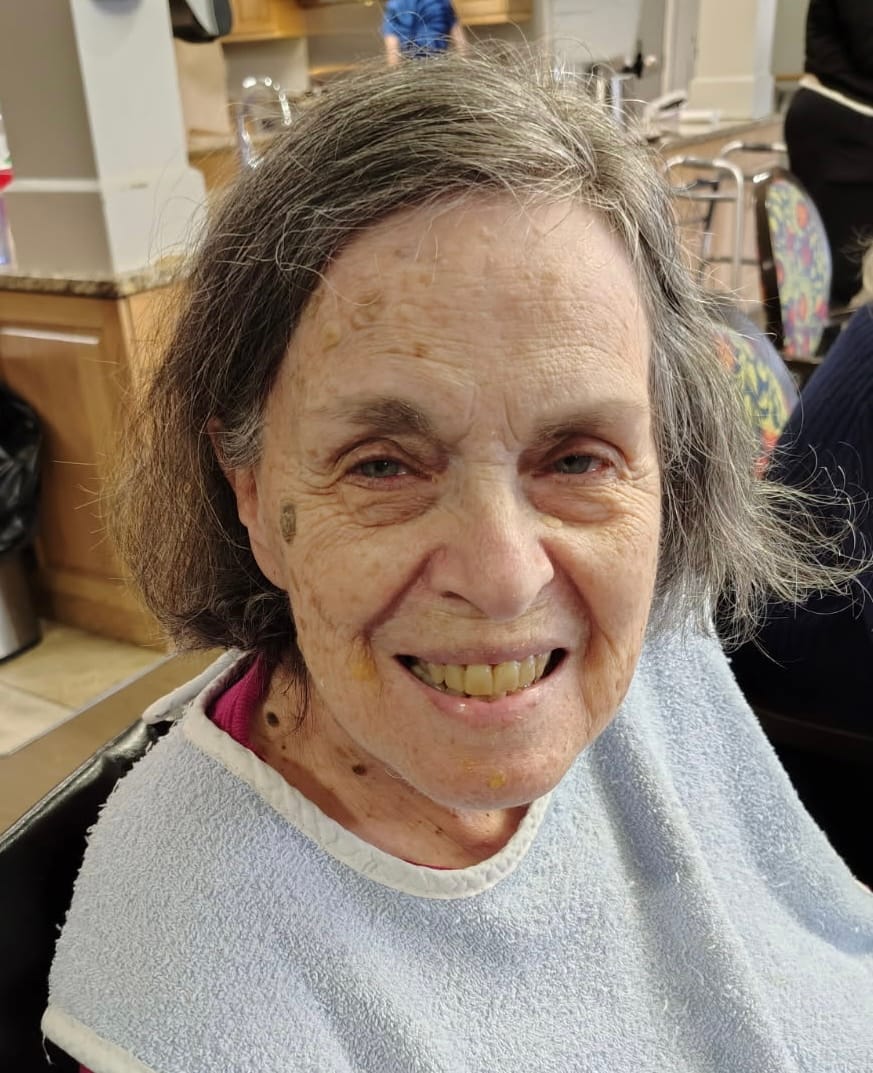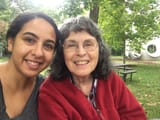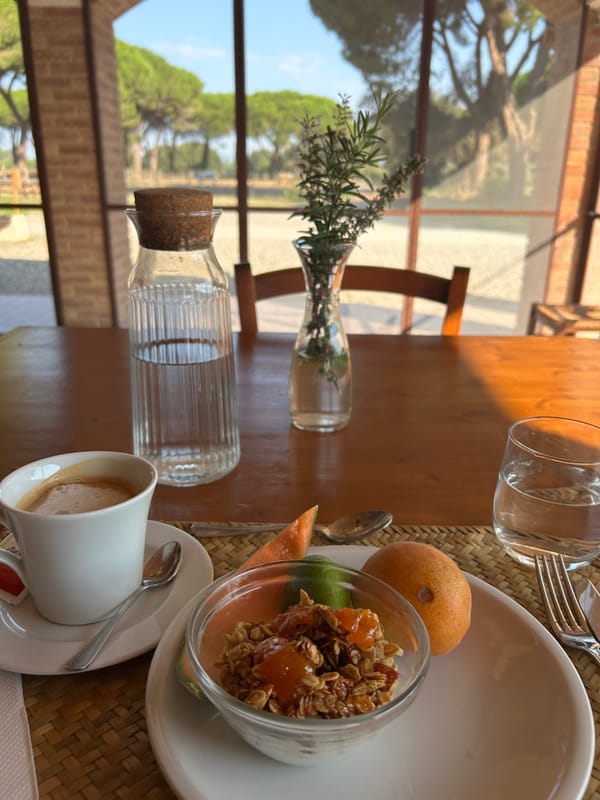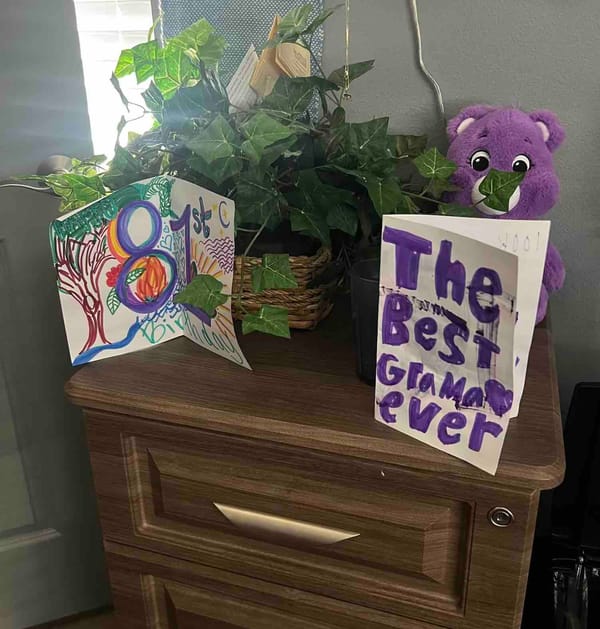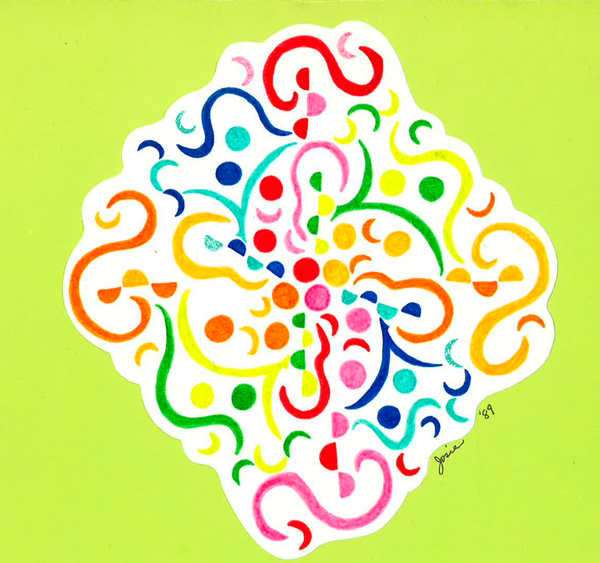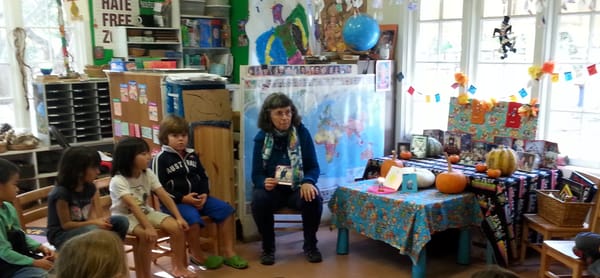Submerge!

In which, I veer off from the aim of this newsletter and share an essay I wrote about my father's death. Special thanks to Deirdre's 2014 magazine writing class and Gaurav Madan for feedback ten years later. Very brief Josie update & photo at the bottom!
Dear Appi,
It's been 12 years since you've been gone. Time plays tricks on me and I think about time on different measurements of scale, like butterflies and turtles. ("The butterfly counts not months but moments, and has time enough." —Rabindranath Tagore) But the problem is that every time I go to India I am reminded you are gone. Now I am back home and I am jetlagged, and I don't know what to tell you on the 12th anniversary of your death, except that I am missing you today.
Love you,
Laki
PS - Please check on mom and see if she needs help in her transition?
PPS - I will add more photos later
February 12, 2013
Prague, Czech Republic In the Hospital Bed
Wires and cables poked out from all sides, controlling his breathing and monitoring his vital signs with each beep and mechanical breath from the hospital machines. Drawings by my 13 year-old sister decorated the sterile walls of the room and the small red copy of the Bhagavad Gita sat on the shelf along with a couple of Jataka Tales comics. I had diligently read to him during my visits. They say hearing is the last sense to go, and I wanted him to have a soft lullaby of words for his exit. I had forgiven him for not being around for most of my childhood. I told him I would take care of everything. The last four days slid, like a snowy blur, into one another.
A priest came the day before from his favorite church in Malostranské Náměstí—the baby Jesus one—to provide him a smooth departure into the next realm.
A heavy silence filled the room.
The nurse turned off the machines, allowing us to sit peacefully without the incessant beeps monitoring his breath.
Finally my elder sister opened a window and muttered under her breath, “You can go now.”
The snow quieted the city, leaving a ghostly blanket of white. It felt especially cold yet also ceremonial, as if everything else in the world paused when his heart stopped beating.
For thirty days my step-mother diligently cooked meals that she brought morning and evening to the swans who occupied the Vltava River near Charles Bridge. Both Hinduism and Tibetan Buddhism have rituals that involve feeding birds after a loved one's death. The days, heavy with grief, melded together as friends and family brought soup and chocolate, and I tried to think of ways to distract my younger sister from her sadness.
The only time five people in a two room apartment felt cramped was at night when I thought I could hear the people crying in the beds next to me. I wasn’t sure if I should put out a hand for reassurance, or let the darkness provide a layer of privacy for tears.
I never feared his death. It had just never occurred to me. Only a few months ago, I had interviewed him about his Ayurvedic research on how to reverse the signs of aging. When I was younger I may have prayed he would die, but only so I could have a better explanation for his absence and inability to fill the role of supportive and physically and emotionally present father that so many of my friends had. Instead, he was a man of few visits, forgotten birthday cards and calls at strange hours.
His death propelled me into a spiral of cleaning, and reading. I read voraciously: Tiny Beautiful Things, The Tibetan Book of The Dead, and several Indian philosophers from the floor to ceiling bookcase occupying his living room in the Prague apartment. I walked through the snow to the hospital and back almost daily, as a routine, just in case his soul was circling somewhere nearby.
For a while I wrote, trying to record everything I remembered about him in my paranoia that I might lose each moment like those glass balls in The Never Ending Story Part II.
We held a Catholic mass in Czech at his favorite church in Prague and two weeks later my elder sister and I were in Kerala, India, where he grew up.
Kochi, Kerala Before Death
My father, born and raised in the small village of Ezhupunna just South of Kochi, left his home soon after his twentieth birthday to study Indian philosophy and yoga with Guru Nitya Chaitanya Yati in the lineage of Narayana Guru, a peaceful man who taught the virtues of all religions. The late 1970s found him questioning his life and searching for something more. He joined a Gurukula in the Nilgiris, a slightly more urban town than the village of his birth. But he didn’t migrate abroad until his path collided with my mother's, on her own soul-searching journey from California. The result was a quick marriage and a move to the San Francisco Bay Area.
Two months before hurrying to Prague, I saw my father in Kerala. That was the last place I saw him upright. We were together for an engagement party for my older sister. I also happened to be there for what was being touted as India's first global contemporary art show — the Kochi-Muziris Biennale. The Biennale is a global art concept that originated in Italy.
I walked through the exhibit with him before he died. Ever curious, he smiled at the creativity and walked eagerly through the exhibits. He marveled at the art, like he had marveled at different religions as a youngster.
The exhibits brought the city to life with murals, installations, videos and events at different locations. “Culture does not rest in grand structures or narratives,” artist Amanullah Mojadidi wrote in Against All Odds, a program book about the Biennale. “As in any port city, Kochi’s culture is reflected in the way the coastal people carry out their activities, eat food, tell tales or sing songs.” If culture rested in food, my father held his close by eating Indian food, at restaurants or at home, nearly every day, even in Prague and when he lived in the States.
Indian innovator Sam Pitroda, said in the same program, “art and culture plays a crucial role in taking us back to our roots.”
Maybe he’s always been on a mission to find something that comes close to Ammachi’s cooking. Jettamma Auntie, his older sister, came closest. After a particularly silly breakup in my 20s, I found myself in her care for a few weeks. I cut onions for her, crying easily (because of all the onion cutting, of course). In the kitchen and we communicated through the Malayalam words for spices and kitchen items — mudi, vaypala, ingi, uli. The smell of onion, mustard seed, curry leaves and red pepper in coconut oil transports me to her modest kitchen stacked neatly with stainless steel pots.
The scent of spices at the Pepper House, one of the Biennale’s venues, assaulted my nostrils and forced me to wonder if it was possible that the smell could be leftover, or if this too is part of the contemporary art experience. Upon entering The Pepper House, an anchor sat as a piece of art, in the middle of the grassy courtyard, unattached to anything else.
The vision of the Kochi Biennale Foundation is to explore the hidden energies in India’s past and invent “a new language of co-existence and cosmopolitanism that celebrates the multiple identities people live with.”
Once called the “Roving Ambassador for Ayurvedic Medicine” my father lived most of his life away from India, in California, Washington and then the Czech Republic, healing clients and teaching the ancient art of medicine based on balancing Vata, Pita and Kapha.
My father had so many identities and residencies that it was difficult for us to close all of his accounts. A naturalized U.S. citizen residing in the Czech Republic for the last 20 years, the Indian banks wanted an Indian death certificate that did not exist.
From Prague to Kochi After Death: Bringing Ashes
Just two months after we stood together in front of murals in Kochi I was back in the city, but this time with a box full of his ashes.
I had brought them all the way from Prague in my carry-on suitcase, neatly packaged by the Czech crematorium. I talked to the ashes (in my head of course) as if they were him. Explaining to the bag that we were now in Dubai and not to worry, we will be there soon. Customs wanted to open the container until I showed them the paper describing what was in my bag. They looked surprised, then appalled, and then waved me along.
I see him in every lungi-clad man, watching old memories like cheesy movie flashbacks as I pass the restaurants and shops we went to together. Sreemati Silks, Jayalakshmi, that’s where we had lunch, that’s where he bought me a sari. Reminders of his presence are in strange places, like ABBA music, the first tape he gave me. His ever-presence in Kerala is both exhausting and comforting.
I took him to an empty apartment where I met my older sister. For nearly a week, we stayed on Marine Drive, overlooking the water and across from Aspenwall, one of the largest exhibit halls of the Biennale.
We left him there while my sister and I went to see the art together. Housing much of the exhibits are structures left by the British. “It’s like the British left all the buildings... Fort Kochi is frozen in time,” my sister said. Maybe we too were frozen in time, walking through honey and trying to move beyond our grief.
Before leaving Kochi, I stopped at the biennale one last time, alone, seeking something to give meaning to it all. One of my favorite pieces by Subodh Gupta is titled “What does the vessel contain, that the river does not” (2012). It’s a big canoe overflowing with someone’s possessions. Using themes of displacement and belonging, the title comes from a poem by Rumi called “The Sufi Path of Love.” When I arrived at the exhibit, the boat was being disassmbled and packed up for its next destination. I, too, was unpacking and repacking for my next destination.
Seeing the art with him before he died and then after, served as a way to observe my own perspective shift. Each time the art took on different meanings, like watching the same waves in different seasons.
What memories of art shows, pictures and postcards—and people— should be brought with us, and what should be left behind? How can we hold on to them when the art and the body have moved on?
Velappadam Beach, Kerala, India Ashes out to Sea
In Kerala, my memories mixed with jetlag. The subtle smell of fish and salty ocean air calmed me as the taxi made its way from the airport to where we were staying.
We made the trip to Kochi with the vision of being dutiful daughters. Though I never seemed to be wearing enough jewelry to appease his traditional Kerala aesthetics, “You look like a pentecost,” he once told me, when I wasn’t wearing a necklace. He and I rarely fought. It didn’t seem useful to disagree with his circuitous logic. He told me once America was the land of the free, because it is free to have potholes.
Our biggest disagreement occurred when I was visiting him at the Prague apartment sometime in high school. It was about ironing. I didn’t see the point of ironing my clothes. He couldn't fathom why I would want to look like a disheveled hippy. I relented, but to remind him I was an independent person, I also informed him I would be taking the train to Budapest for a few days. I wandered around, went to bookstores in which the only English books seemed to be by Paolo Coehlo, and I sat next to the river. The freedom to flee made me look forward to the return home to the Prague apartment.
Those were just some of the memories that bounced around my brain as we traveled around his homeland. Glimpses of backwaters, bright green paddy fields, coconut trees and the sight of the ocean—my most trusted and reliable companion—greeted me with a surreal beauty.
The sun shone brightly as my elder sister and I arrived at the beach. The teal water and hot sand made the gentle ripples of the waves appear inviting. We carried with us the cardboard box with a sealed tight black plastic tub containing my father’s ashes.
It was so tightly sealed, we couldn’t open it. We asked the driver if he had any tools, but all he had was a lone screw-driver. After a few minutes of maneuvering, smashing and prying, the lid cracked open. We walked knee-deep into the ocean and held our hands in prayer-position while my father’s friend — a supposed Hindu priest of sorts, said a few blessings in Malayalam. He commanded my sister to “submerge!” Not once, but several times. Calling it out as if it was a prayer in need of shouting.
“Submerge! Submerge!!”
Submerge is now a phrase we recall with laughter. The gray ash soon mixed into the water and the waves took him out to sea.
The struggle with the box could’ve been one last way he held on a little longer. Perhaps it was also a metaphorical reminder to laugh at life, no matter what. The ridiculousness had remnants of his favorite comedian, Mr. Bean. We would giggle while watching TV together, his laughter taking over his whole body as it shook with his unique cackle every time he watched Mr. Bean or Tom & Jerry cartoons.
“If I’m not laughing while I work, I conclude that I am not communicating nourishment, since laughter is the most surefire healant I know,” Toni Cade Bambara, author and civil-rights activist once wrote. Maybe this final challenge was a healing laughter, balancing the bitter with the sweet.
When my sister opened the window in the hospital room I like to think that his soul flew out and transitioned to wherever souls end up. Now, back home again in California, I find it comforting to think my father has returned to the ocean, breathing in and out with the waves.
